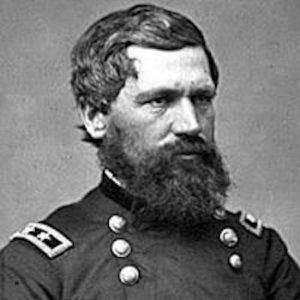
Oliver Howard
*Oliver Howard was born on this date in 1830. He was a white-American soldier and spiritual base administrator.
Oliver Otis Howard was born in Leeds, Maine, the son of Rowland Bailey Howard and Eliza Otis Howard. Rowland, a farmer, died when Oliver was nine years old. Oliver attended Monmouth Academy in Monmouth, North Yarmouth Academy in Yarmouth, and Kents Hill School in Readfield and graduated from Bowdoin College in 1850 at 19. He then attended the United States Military Academy, graduating in 1854, fourth in his class of 46 cadets, as a brevet second lieutenant of artillery.
He served at the Watervliet Arsenal near Troy, New York, and was the temporary commander of the Kennebec Arsenal in Augusta, Maine. In 1855, he married Elizabeth Anne Waite, with whom he would have seven children. In 1857, he was transferred to Florida for the Seminole Wars. In Florida, he experienced a conversion to evangelical Christianity and considered resigning from the Army to become a minister. His religious proclivities later earned him the nickname "the Christian general." Howard was promoted to first lieutenant in July 1857 and returned to West Point the following September to become a mathematics instructor. As the American Civil War began, he decided to remain in the service of his country.
As a brigade commander in the Army of the Potomac, Howard lost his right arm while leading his men against Confederate forces at the Battle of Fair Oaks/Seven Pines in June 1862. As a corps commander, he suffered two major defeats at Chancellorsville and Gettysburg in May and July 1863. Still, he recovered from the setbacks as a successful corps and later army commander in the Western Theater. After the war, he was given charge of the Freedmen's Bureau in mid-1865, with the mission to integrate the former slaves into Southern society and politics during the second phase of the Reconstruction Era.
Howard took charge of labor policy, setting up a system that required freedmen to work on former plantation land under pay scales fixed by the Bureau, on terms negotiated by the Bureau with white landowners. Howard's Bureau was primarily responsible for the legal affairs of the freedmen. He attempted to protect freed Blacks from hostile conditions but lacked adequate power and was repeatedly frustrated by President Andrew Johnson.
Howard's allies, the Radical Republicans, won control of Congress in the 1866 elections and imposed Radical Reconstruction, resulting in freedmen being given the vote. With the help and advice of the Bureau, freedmen joined Republican coalitions and won at the ballot boxes of most of the southern states. General Howard is also remembered for playing a role in founding Howard University, which Congress incorporated in 1867.
The school is nonsectarian and is open to both sexes, regardless of race. On November 20, 1866, ten members, including Howard, of various socially concerned groups of the time met in Washington, D.C., to discuss plans for a theological seminary to train Black ministers. Interest was sufficient, however, in creating an educational institute for areas other than the ministry. The result was the Howard Normal and Theological Institute for the Education of Preachers and Teachers. On January 8, 1867, the Board of Trustees voted to change the institution's name to Howard University. Howard served as president from 1869 to 1874.
He was quoted as saying, "The opposition to Negro education made itself felt everywhere in a combination not to allow the freedmen any room or building in which a school might be taught. In 1865, 1866, and 1867, mobs of the baser classes at intervals and in all parts of the South occasionally burned school buildings and churches used as schools, flogged teachers or drove them away, and in a number of instances murdered them."
After 1874, Howard commanded troops in the West, conducting a famous campaign against the Nez Perce Native American tribe. He founded Lincoln Memorial University in Harrogate, Tennessee, 1895 to educate the "mountain whites." Oliver Howard died on October 26, 1909.